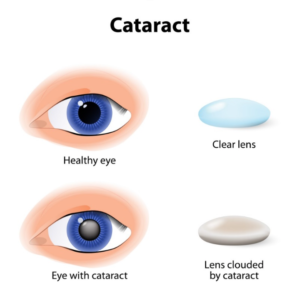The lens is a structure in the eye that allows light to pass through, enabling our eyes to see. When the clear lens becomes cloudy, we call this cataract. There are various sorts of cataracts, and some affect vision more than others.

What is the main cause of Cataract?
Most people start to develop cataracts after the age of 65, but some people in the 40s and 50s can also develop the condition. Certain things can make it more likely that you will develop cataracts such as:
- Diabetes – people who have diabetes often develop cataracts earlier.
- Trauma – having an eye injury can cause the injured eye to develop a cataract.
- Medications – some prescription drugs can cause cataracts such as steroids.
- Eye Surgery – surgery for a retinal problem will likely lead to cataracts in the affected eye at some point in the future.
- Eye conditions – such as retinitis pigmentosa, glaucoma or uveitis may also cause cataracts.
- UV exposure – especially UV-B may cause some kinds of cataracts,
- Smoking – alters the cells of the lens through oxidation and the accumulation of heavy metals like cadmium in the lens.
What are the symptoms of cataracts?
Cataracts normally develops very slowly. At first the changes they make to your sight may be difficult to notice, but as they get worse, you’ll start to notice symptoms like:
- Your glasses are dirty and need cleaning, even when they don’t.
- Your sight is misty and cloudy.
- You’re more sensitive to light – bright sunlight or car headlights may glare more.
- Everything looks a little more washed out than it should.
What happens if I have cataracts?
If you are informed that you have a cataract it doesn’t mean you’ll require surgery immediately. Depending on the type and position of the cataract you may still be able to maintain a good level of vision, with or without glasses.
We often monitor cataracts between 6-12 months depending on the level of vision achieved with correction. It also helps both you and your optometrist understand whether you’re coping with the cataract or whether surgery is necessary.
There isn’t any medicine or eye drops that can remove cataracts, surgery is the only way to treat them. Unfortunately, there’s nothing you can do to stop cataracts from getting worse.
Cataract surgery on the NHS can only be done if you are struggling with:
- Reading
- Driving
- Or if your optometrist feels it is required.
We do offer private referrals to Hampshire Clinic in Basingstoke and Private Clinics in Berkshire.
What should I expect with a cataract operation?
Cataract operation is one of the most common eye surgeries carried out today. It usually takes approximately 30-40 minutes under a local anaesthetic, which means you are in hospital for half a day. The procedure involves removing the lens and inserting an intraocular lens/implant.
If you require both cataracts to be removed in each eye, they will be done on separate occasions. This allows one eye to heal before they attempt the other.
The risk of complication is very slim, however it important to know that with any type of surgery there is a risk element. The surgeon will discuss this with you in a lot more detail and discuss any other known risks before the operation.
For more information about what to expect watch this helpful video from the RNIB which features Roy talking about his cataract surgery. www.youtube.com/watch?v=iDZe4wnQdlw
It is common once the cataract has been removed and replaced, a membrane can form causing the lens to go cloudy again, which usually occurs months to years after the operation. This can cause your vision to deteriorate just like the cataract. Surgery is not required in this case but can be rectified with a painless laser procedure that takes approximately a few minutes. This procedure will help remove the debris that is obscuring your vision.
As part of your ongoing care at Optimum Vision Clinic we will refer you back to ophthalmology if required.
If you have any concerns or would like to speak to one of our Optometrists to be referred for cataract whether through the NHS or privately, just get in touch.


